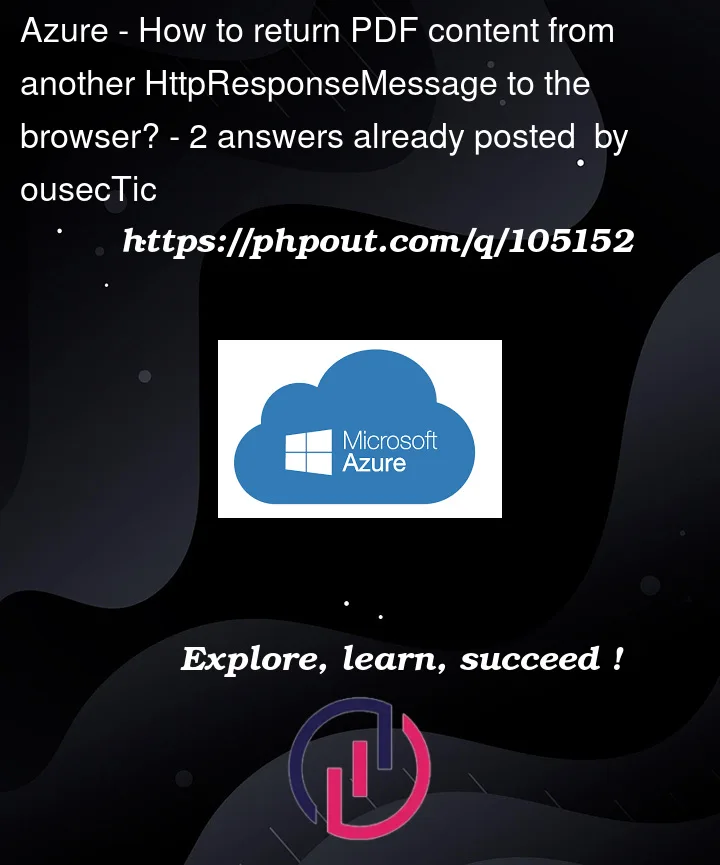I am in the process of creating a proxy server that makes a request to a PDF Blob link then takes the request to setup its HttpResponse Header which we sent to the client. This diagram should explain
As of now, I am successful at making the request to get the pdf content however I am not sure how to send that back to the user. I have followed other Stackoverflow post such as this one : https://stackoverflow.com/a/43232581/10541061
I turn the response message in step 3 of the diagram to a stream and sent it back in the new HttpResponseMessage content.But instead of PDF content , I get a json file
What I want to return to the client
What I am actually returning to the client
Here is the code I am using to create this proxy endpoint
[AllowAnonymous]
[HttpGet("openPDF")]
public async Task<HttpResponseMessage> OpenPDF([FromQuery] string url)
{
var _httpClient = _httpClientFactory.CreateClient();
var response = await _httpClient.GetAsync(url);
var stream = await response.Content.ReadAsStreamAsync();
HttpResponseMessage message = new HttpResponseMessage(HttpStatusCode.OK);
message.Content = new StreamContent(stream);
message.Content.Headers.ContentLength = stream.Length;
message.Content.Headers.ContentType = new MediaTypeHeaderValue("application/pdf");
return message;
}
EDIT
Ok so this actually sends back the PDF when I write the proxy like this
[AllowAnonymous]
[HttpGet("openPDF")]
public async Task<FileStreamResult> OpenPDF([FromQuery] string url)
{
var fileStream = new MemoryStream();
var _httpClient = _httpClientFactory.CreateClient();
var file = await _httpClient.GetStreamAsync(url).ConfigureAwait(false);
await file.CopyToAsync(fileStream);
fileStream.Position = 0;
return File(fileStream, "application/pdf", "filename.pdf");
}
The problem is I want to update the content-disposition to inline so I can force this to open in the browser instead of downloading.So I decided to take the filestream and injecting that in the httpResponseMessage.content instead but that still didn’t work. It would continue to send me a json file
[AllowAnonymous]
[HttpGet("openPDF")]
public async Task<HttpResponseMessage> OpenPDF([FromQuery] string url)
{
var fileStream = new MemoryStream();
var _httpClient = _httpClientFactory.CreateClient();
var file = await _httpClient.GetStreamAsync(url).ConfigureAwait(false);
await file.CopyToAsync(fileStream);
fileStream.Position = 0;
HttpResponseMessage message = new HttpResponseMessage(HttpStatusCode.OK);
message.Content = new StreamContent(fileStream);
message.Content.Headers.ContentType = new MediaTypeHeaderValue("application/pdf");
return message;
}
To be honest, I thought defining the content-type should suffice but guess not







2
Answers
This is pretty straight forward for .NET 6… suspect it should be roughly the same for .NET 4x… This uses the NuGet package Azure.Storage.Blobs
https://github.com/Azure/azure-sdk-for-net/blob/Azure.Storage.Blobs_12.13.1/sdk/storage/Azure.Storage.Blobs/README.md
for .NET 4x.
try to add: